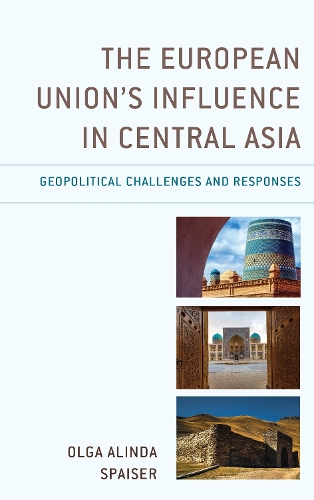
The European Union's Influence in Central Asia: Geopolitical Challenges and Responses
(Hardback)
Publishing Details
The European Union's Influence in Central Asia: Geopolitical Challenges and Responses
By (Author) Olga Alinda Spaiser
Bloomsbury Publishing PLC
Lexington Books
12th March 2018
United States
Classifications
Professional and Scholarly
Non Fiction
341.24220958
Physical Properties
Hardback
270
Width 159mm, Height 240mm, Spine 26mm
581g
Description
Unknown yet highly strategic, Central Asia attracts the interest of major global powers due to its vast energy resources and crucial geographic position. Russia, China, and the European Union view this region as an indispensable springboard to enhance their political and economic influence on the Eurasian landmass. Thus, facing strong competition and working on low budget, the EU is attempting to establish itself as a relevant and influential actor in an environment in which its leadership role is far from certain. Unlike in other post-communist regions, the EU is not able to rely on the attractiveness of its political models, and risks being marginalized by other global powers. The crucial question then is: How does the EU exert influence in such a challenging geopolitical context Which strategies does the EU apply to be an actor who counts Through an analysis of the EUs discourse, instruments, and the reception of its policies in Central Asia, this study argues that the EU consciously takes the position of a second-tier actor who acts as a consultant and projects a picture of itself as an honest broker with no geopolitical agenda. The EUs influence is confined to niche domains in the security sphere that are nevertheless important for the regional security. The EU is not a great power in the region nor is it willing to become one. It does, however, have comparative advantages in being perceived as inoffensive and for occupying areas that are neglected by the other actors, such as governance and water security.
Reviews
Olga Alinda Spaiser has provided a valuable addition to the scarce academic literature on EUCentral Asia relations. The European Union's Influence in Central Asia offers a rich overview of Central Asia as a Far Neighbourhood of Europe where relations were intensified since 2007 via an EU strategy for the region. Spaiser critically assesses the European Union as a normative actor and realistically analyzes Europes interests in a region where Brussels is a second-tier actor after Beijing and Moscow, but is valued as a partner by Central Asian regimes. This study is an important read for scholars and policymakers focusing on EU foreign and security policy, as well as Central Asia watchers. -- Jos Boonstra, Centre for European Security Studies
Composed of five independent countries that emerged as a new geopolitical space after the fall of the Soviet Union, Central Asia has been studied in its various transformations. In the sphere of international politics and geopolitics, this interest in Central Asia has often been limited to the strategies of main actorsRussia, China, and to a lesser extent, the United States. However, there is another actor that has been relatively active and influential in Central Asia, with a very specific approach that has been neglected in its contribution to the transformation of Central Asiathe European Union. Olga Alinda Spaisers book is a valuable contribution that fills the void. Thanks to this new and original study based on extensive fieldwork in Central Asia and Europe, we have an excellent analysis of the relations and interactions between the European Union and Central Asia and the regions place in global politics. -- Bayram Balci, Sciences Po
Author Bio
Olga Alinda Spaiser is associate scholar in the Center for European Studies at Sciences Po and project manager for the DirectorateGeneral for Crisis Prevention, Stabilisation and PostConflict Reconstruction in the German Federal Foreign Office.
